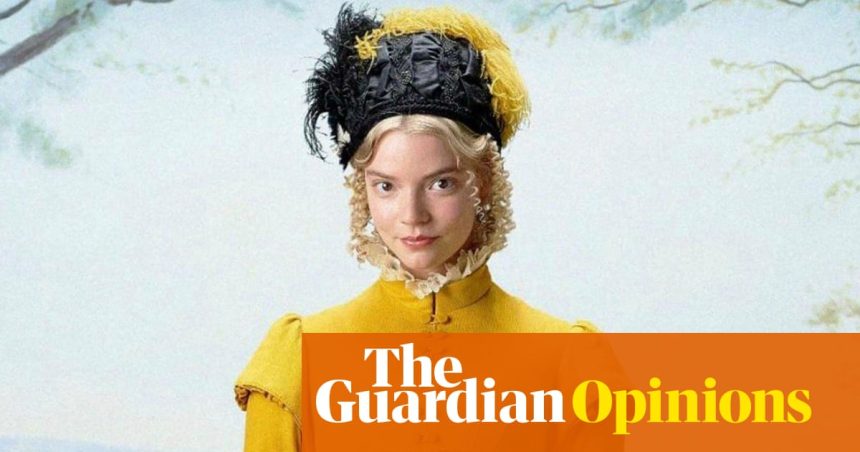News that Andrew Davies – the man behind the nation’s most beloved Pride and Prejudice adaptation – is planning to have Jane Austen’s Emma die in childbirth drew gasps from audiences at Cliveden literary festival last weekend. Davies is planning to explore the dark undercurrents of Austen’s work in adaptations of Emma, Mansfield Park and unfinished novel The Watsons, and while his ideas may shock those fans wedded to Austen as a romcom author, I couldn’t be happier.
I have always loved a period drama, especially literary adaptations. A few years ago, though, Austen fatigue set in for me. Maybe it’s the fact I’ve seen at least three Emmas and three Pride and Prejudices, and read each of her novels at least thrice. There are so many other stories in the world, many waiting to be discovered and adapted. Unless there was some new spin or interpretation being offered, I simply stopped being interested.
As such I enjoyed Sanditon – what joy to have Austen’s West Indian heiress brought to life. But Emma with Anya Taylor-Joy bored me, and the less said about Netflix’s Persuasion (“now we’re worse than exes; we’re friends”), the better.
If comments from readers of the Times are anything to go by, audiences will get in a froth about how “woke” Davies’s adaptations are when they make it to our screens, especially in their approach to slavery. Austen makes passing reference to slavery in Emma and Mansfield Park; in the latter it is clear that this is where the Bertram family have made their money. So why not show scenes making this explicit? Why not show Sir Thomas and Tom brutally quashing a slave revolt on their plantation in Antigua? Contemporary readers will probably have inferred this as the purpose of their trip in the novel. The moment when Fanny, the protagonist, brings up the topic of slavery and is met with dead silence by her cousins may feel subtle to us – to her 19th-century readers, it would have been the opposite.
As for death in childbirth, I can’t be the only Austen lover who has always wondered about what happens to her heroines after the “happy ending”. Austen herself knew women who had died this way, as so many did. There’s a reason why the wedding makes a good place to stop, as anyone in the 19th century would have understood. It’s not that Austen sanitises and sugarcoats, it’s that modern readers – and many screenwriters – do. Think about how radical it felt when Joe Wright opted for more mud and a handful of farmyard animals in his more realist adaptation of Pride and Prejudice. That, amusingly, shocked viewers at the time, and yet what he created in his depiction is a Longbourn that feels vivid and true. Making tangible certain aspects of Austen’s works – or even filling in some of what is unspoken – isn’t necessarily an attempt to shock, but about providing a setting that feels real. Everything doesn’t have to feel so mannered. Period dramas such as House of Guinness, with its depictions of childbirth and its portrayal of the horrific legacy of the great hunger inflicted on Ireland by the English, have really raised the stakes.
I’ve always embraced the darkness in literature. Being technically what the internet calls a “Brontë girlie”, I grew up being repelled and fascinated by the red room in Jane Eyre, and by Bertha Mason’s madness, before falling head over heels for Wuthering Heights at 14. But when it comes to dark themes, is there such a thing as going too far? The Brontë girlies have been in revolt over Emerald Fennell’s forthcoming Wuthering Heights adaptation, which not only has a white Heathcliff and looks to have put the actors in costumes from the “wrong” period, but according to test audiences opens with a scene in which a nun gropes a recently executed man’s penis. You do find yourself wondering if it’s necessary, when the source material manages to be fairly depraved already. Heathcliff hangs a puppy and digs up Cathy’s body, for instance. Wuthering Heights is famously difficult to adapt, but I rather liked Andrea Arnold’s 2011 social realist film.
Amusingly, there was a debate at the Cheltenham literature festival a few years ago with the immortal title “Heathcliff versus Darcy: who is the bigger shit?”. I think the jury is still out. Heathcliff may have murdered a dog, but until we know how Darcy makes his money it’s all to play for. One of the panellists, Dolly Alderton, described Darcy as a “conceited, bullish and rude snob who, as my fellow millennials would say, needs to check his privilege”. (Will her Netflix adaptation reflect this? Now that would be new.)
I’m wary of purists – as all creative people should be. If anything, I’m often in favour of going further, of having screenwriters and directors of period drama make concrete the dark undercurrents of so much 19th-century literature. That Andrew Davies is talking about exploring, for example, the “psychopathic” Frank Churchill’s hold over Jane Fairfax in Emma is only to be welcomed. As for Emerald Fennell’s Wuthering Heights, it sounds utterly appalling and I will be there at the doors of the cinema the moment it opens.
after newsletter promotion
-
Rhiannon Lucy Cosslett is a Guardian columnist
-
Do you have an opinion on the issues raised in this article? If you would like to submit a response of up to 300 words by email to be considered for publication in our letters section, please click here.

Leave a Reply